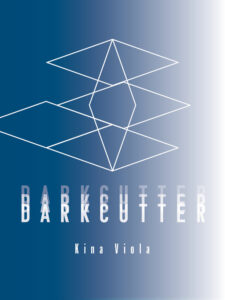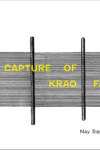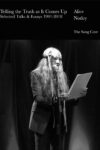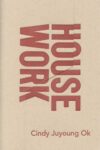
[The Atlas Review; 2020]
“Don’t / forget, the poetry / with teeth, the poetry that won’t lie down & die.”
So begins Kina Viola’s chapbook DARKCUTTER, a salient and foreboding object of poetry, each page whetted for resistance against cultural phenomena propagating emotional and bodily violence. The formal structure of Viola’s poetry successfully mirrors the nonlinear narrative distortions and dissociative mental imagery posed within it. DARKCUTTER pathologically fragments and congeals: some poems are identified in a traditional manner by numbers or titles, others move boldly down the center of the page as manifesto, while other strains trickle curiously like a residue of the subconscious, spilling or interpolating into awareness. By rendering the text in such a way, Viola lends her poems a spatial dimension; an inner domain which is further accentuated by a particular lineage of poetics likened by author Liz Bowen to the concepts of Alice Notley’s “underground” and Ariana Reines’ “slaughterhouse”. Early on in the book, the poem “INSTRUCTIONS” reads:
“Sometimes we pretend what we do above earth doesn’t affect it. Sometimes we clean the killing floor, other times we do not. Sew up the ground with lace-black stitches.”
Further along in the book, this sense of psychic space or physical interiority can be felt in poems, like “DAY CARE”, manifesting in the lines:
“Just so you know, my body doesn’t forget and just so you know, / my cavities will not repair
underneath eggshells there’s a thin membrane between the world / that kills it and the embryo
this is before it shatters / this is before we are food.”
I relate the spatiotemporal feeling within the poems to the way memory might inhabit the mind, or the way experience stratifies in the body’s cells — both concealed and revealed. In regard to particularly traumatic memories of assault, the book takes on characteristics of a haunted space; like a tesseract, or a room within a room. For these reasons, images and sensations within the poems feel super-sensory or perhaps cinematically rendered. The book’s cover sets the mood, with sharp-white geometry against a snowy blue-to-white gradient, and in the style of a movie trailer, the title DARKCUTTER ominously fades-in. As a mechanism of resistance, this hyper-aesthetic or dreamlike internal logic is effective in that it finds ways to courageously reflect nearly unreflectable agents and systems of abuse.
From cover to cover (a relatively short span of 40 pages), DARKCUTTER elapses within this chilly, slashy codex of symbols, this transmutation of body into pure mood which Viola’s text fiercely exhibits. I believe that this mood-language is what makes the poetry most exciting and so affective, and approaching a review of DARKCUTTER from a more conventional critical lens might miss an opportunity to express that mood. For this reason, I’ve chosen a chameleonic and ekphrastic lens through which my response to Viola’s writing can be viewed, or felt.
From within the dark of the room that is DARKCUTTER, to the extremity of its calcareous shell, the reader watches the color blue turn white, like the sky, or a sound strangled by snow, then shatter into starlings — a murmuration that also could be a knife, or a pen that won’t stop bleeding. Each shrapnel-sliver part of a unified, bibliomorphic void. DARKCUTTER is a wall dented by heads, and yes, a cocked hammer for the demiurge of men.
“They’re coming”, Viola warns. They. Him. Abusers. The coders of the prey-body, like the blue machine and its cryogenic plexuses. Everything meat-russet, everything muscle-blue and scissored-out by the voices of a nameless self, or a machine in a nightmare sleep, kept there, diamond-sharp, ovoid to the touch and simile-bound for a cutting. DARKCUTTER mimics the first night. Dusk settling like snow again as the soundtrack burns. Seeds rattling in the ovary ripening off each plant. The language of survival Viola writes into every image speaks about meat, a fear-meat designed deep in that civic cell, in that Eden, to reek like it, the sacred killing zone of this movie-church. It’s to this historical locus that the poems deliver the reader. Hallucinating her sounds in the scraping of fat and gristle from the hollow ends of the rib, the real chewing of mirrorshards.
“I am drawn to the gentle and met with violence, so I become violent,” Viola writes.
This violence grieves you like something dressed for a killing, a body-horror incarnation, but reflected in the bovine eye of this murder-woman, this human-animal subjugatee, which Viola habituates in some textual cage-form of pain, before an empty husking. The technique was learned and the technicians know this, but not how it felt — the subjective experience of this act of violence. She learned the technique from a cat, “a small carnivorous mammal comforted by dark, warm spaces. A womb is an enclosed shell, a cardboard box. The cat was my haven and I was his deathbed,” Viola writes. The cat too is a symbol, a feline poltergeist of sex and violence and its subversive politics of all taken against their will, craving meat, insisting on meat.
Viola speaks the body-word, as saintly a starpuker of hysteria provoked by the pastiche hegemony of the masculine. Not to be clichéd in the vacancy of confectionery aisles, the poems here expand and contract in their own delicate soma, fuming in the stomach. DARKCUTTER is the room where someone eats and is eaten. Where the death-surplus is hidden. Softness in all corners, Viola constructs the effeminate body of the room, of animal, whose womb-shadow drips like the moon.
“I am an animal
so I prepare my animal body
for the apocalypse,
do pushups on the dusty rug,
do pushups in reverse to target
my triceps, dip my body
using the ceramic outer wall
of the bathtub. I take a personality
test: FAST, STRONG, &
ALMOST IMPOSSIBLE TO KILL.
I am frantic, wild in the dark.”
The subjecthood of animal has turned it blue with blood. Inside out. A raw green instinct left to grow inside a simulacrum. The male as artifice. DARKCUTTER is the patricide of sound, a moss-gag with its mirroring of death and animalized from what is absolutely non-animal, or maybe all too beastly. All in the room, the room with animal, the animal-room severed from its surroundings, by an invisible membrane in the androscene which Viola stretches thin enough to forge a reproduction. A hideous Matryoshka ensemble of body within body, a trauma bionics that have her as monstrous as the world they share. That’s where we left her (the sociohistorical we, we the reader):in the translucent cartilage of glaciers, in the room-meat of the abattoir, on the cutting room floor.
“Exonerate the case of the human girl-child, let her back into this mud-stained atmosphere.”
From all girlhoods, like ice thawed into soft claret holograms of vivisectivity, the mesh of Viola’s text snows like mica glass and opens wounds so discreet, yet so evenly, over the skin, that a scrawny blood-mannequin emerges from the molt. DARKCUTTER is the girl factory. The panic room. Eggshell walls, eggshell shrapnel, the uncauterized floors and ceilings of a parahistorical woundscape. This body-space is described in many places and in many ways but perhaps the most lucid of examples may be offered in the alarming poem “REGENERATION ROOM’:
“When does man become a machine? And when does a machine become a body? When does a mind become a beast? Capillary actions make blood defy gravity. We don’t follow the rules of nature anymore. …
In the ruins of a city is a room of harvested plasma. Of windows made into doors made into screens made into walls. Made into a fortress.”
Likely a paradox to the many allusions to anguished materiality, DARKCUTTER is a sky-thing, earthing so heavy its pigment turns blue, the bowels of a genealogy filleted like clouds into a cream too raw to drink. Her bloodhoney remastered in 3D has nutrified all our faces. DARKCUTTER fables nothing in the way it makes clear where human realities will and shall not meet and diverge. Not the seeing-is-buying binary they sell in wholesale catalogues, nor any logic of cuisines and climates apart from where one’s ancestors settled, but an exorcism of the room, of the flayer and his flayed god. The cloven tongues grow thin, the marathon of semiotics is scraped into the whelping box, across the fields planted out in open sky like some grotesque bird made of cairns.
What to do with this schism? Where life and blood run together into a death grip that refuses closure. Repeat to yourself that the refrain to escape is not natural, and the voice given, echoing through that silence, was written long ago. In Kina Viola’s words, “I am both mechanical and naturally found within the dirt. That which is both holy and lowly, I am the bathwater of my released toxins. This is how we get away. It’s not down the drain.”
Scream us into action. Scimitar the itch. As a disembodied yet sirenic scream, DARKCUTTER is a stark reminder of the cultural fear stigmatized around the female voice. Like it or not, the reader is implicated in Viola’s bladed epiphany. Her kniving motion has its logic in water, soft enough so that no bone clinks against the floor. Now the devoured become devourer. Give them then to the water that shattered when blue was not white enough to be vestal. Winter is coming. Hold vigil at the threshold. In the magnets in your blood. Remind yourself that what is happening in the snow of blood is part of an escapable fate. Remember the simple chagrin. DARKCUTTER as the caterwaul of primal retribution. Above all, remember poetry as a warning.
Evan Isoline is a writer and artist living on the Oregon coast. He is the founder/editor of a literary project called SELFFUCK.HELP and his full-length debut is forthcoming from 11:11 Press. Find him @evan_isoline.
This post may contain affiliate links.







